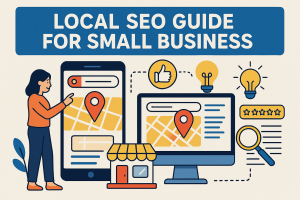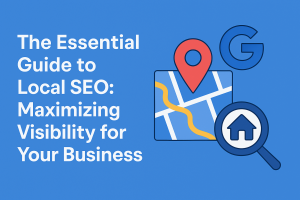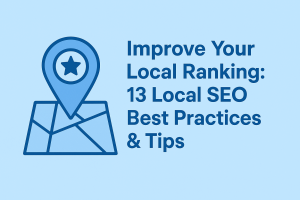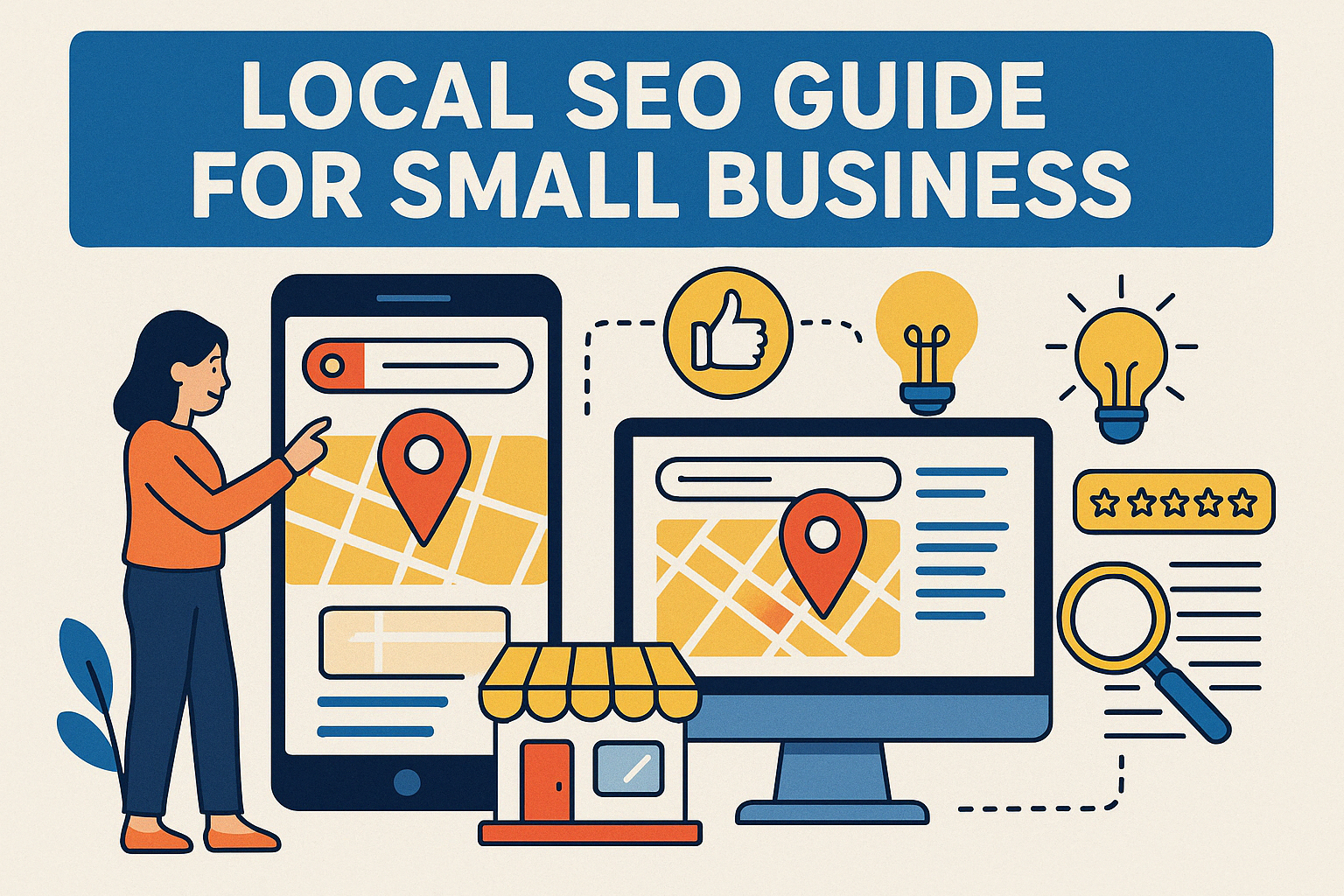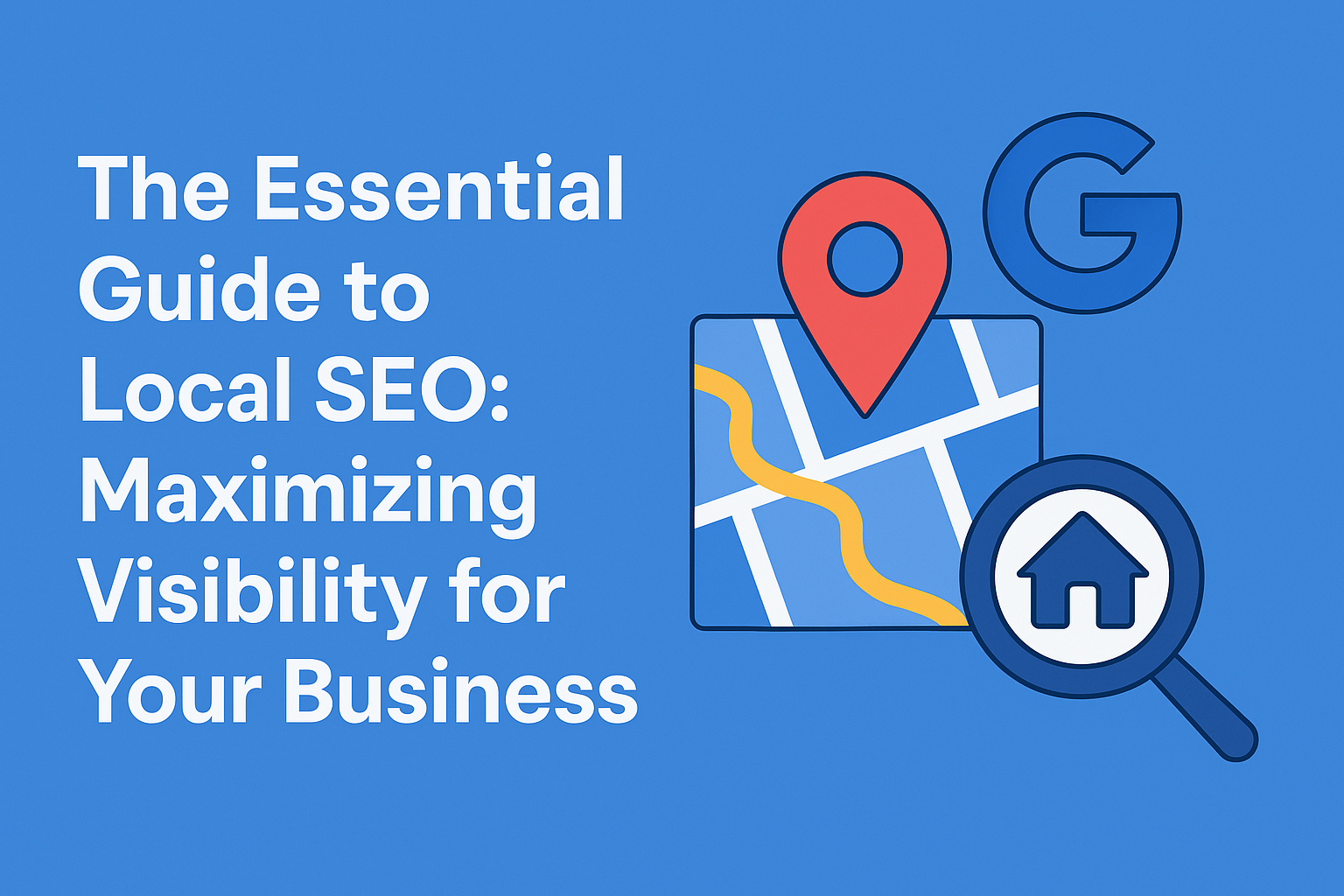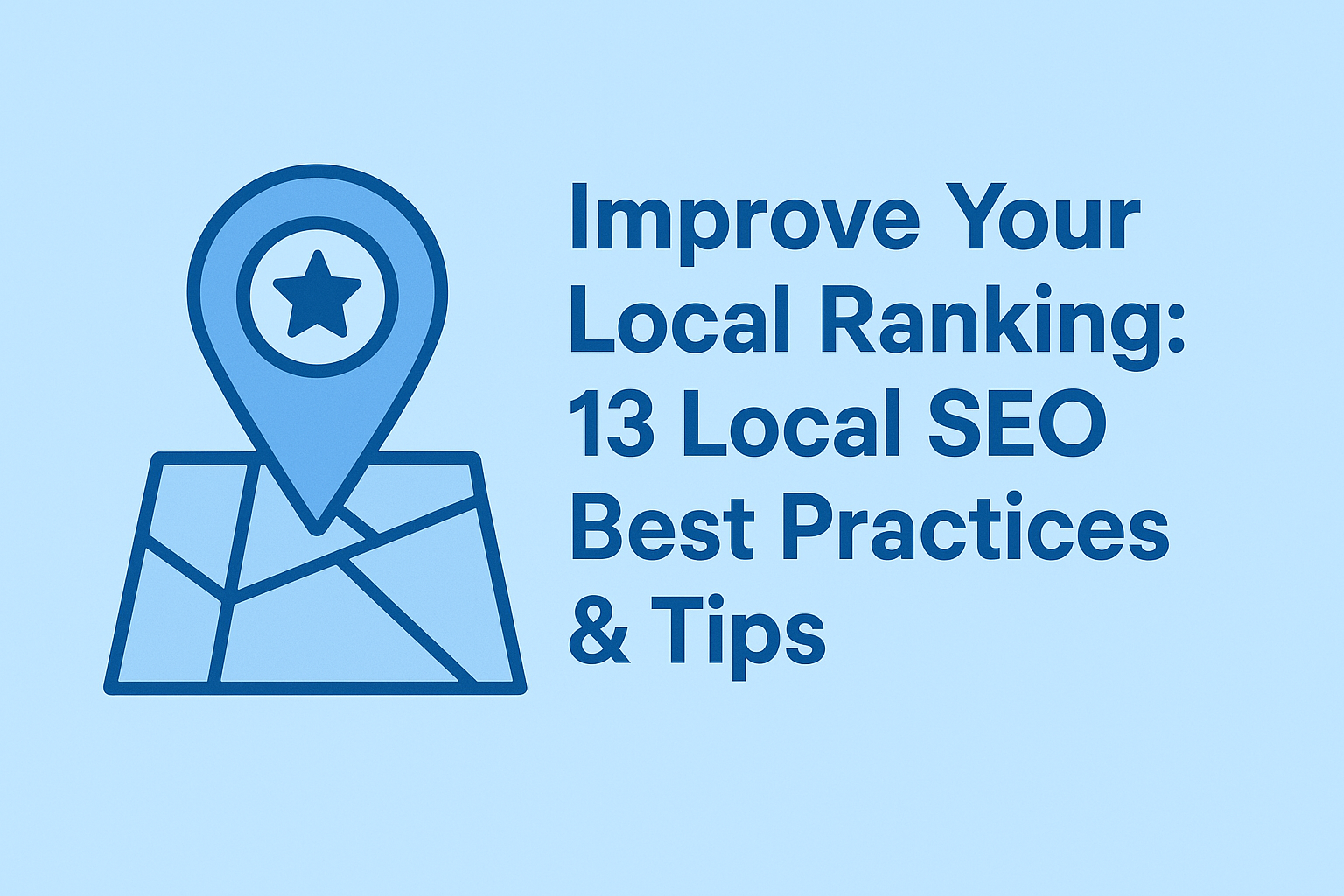Outsource Your SEO Like a Pro: Choosing the Best Local SEO Outsourcing Company

Sanya Kaushal
Sanya is a seasoned SEO and content writing expert with a 10 years of experience. She is skillfully driving organic growth and crafting search-optimized content that engages audiences and elevates brand visibility across industries.
Let’s talk about local SEO outsourcing—something I’ve helped hundreds of small businesses with over the last decade.
If you’re feeling stuck trying to rank your business on Google or overwhelmed by terms like “meta tags” and “backlinks,” you’re not alone. I’ll break this down step-by-step, like I’m chatting with a friend over coffee.
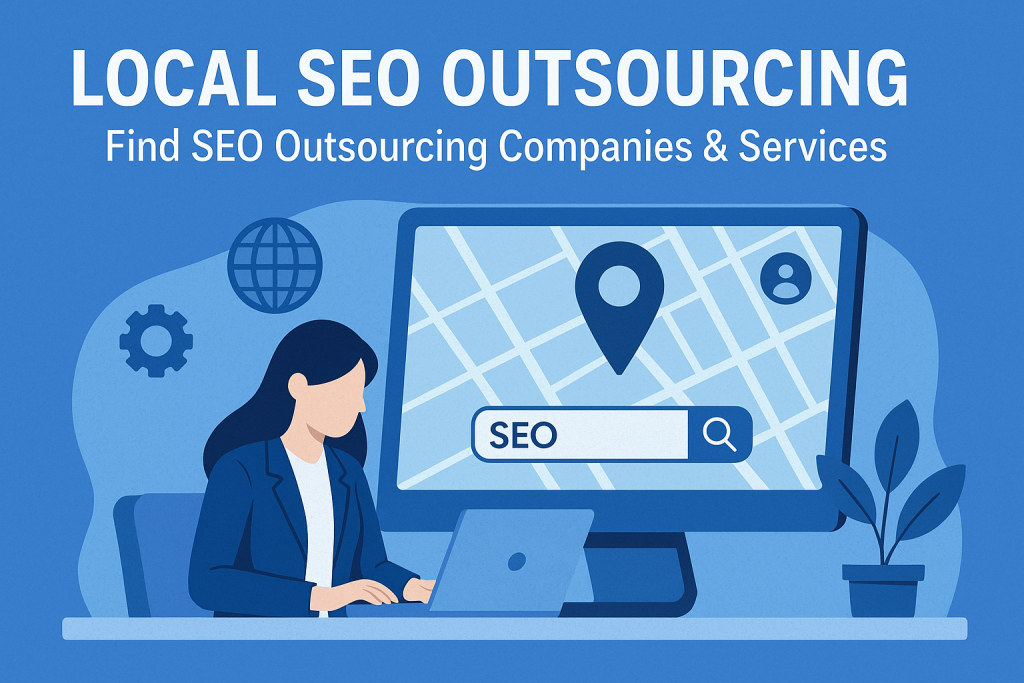
What is Local SEO?
Local SEO is, at its core, the process of optimizing a business’s digital presence so that it appears prominently in search results when local customers look for services or products near them. Imagine you run a small bakery or a neighborhood florist; when someone searches “best cupcakes near me” or “fresh roses in [City],” local SEO makes sure your business stands out.
Benefits of Outsourcing SEO Services
Outsourcing SEO and digital marketing needs has become a trusted approach for many businesses, including those that I manage as a freelancer.
Instead of trying to be an expert in every corner of digital marketing, I would focus on my core strengths while partnering with specialized service providers.
This strategy has several distinct benefits:
Expertise: Outsourced SEO professionals are dedicated to the nuances of this domain. I would rely on their extensive, up-to-date knowledge to implement strategies that I might not have the time or resources to master on my own.
Cost-Effectiveness: An SEO provider allows for a more measured investment. I would recommend focusing on specific, high-impact tasks rather than spending a large sum on full-scale, in-house operations. This model helps preserve a client’s budget while delivering measurable improvements.
Flexibility: The white label SEO model is inherently flexible. I would design contracts and service levels that can scale based on seasonal demand or evolving business needs, ensuring that clients only pay for the work they need.
Time Savings: By outsourcing non-core activities, time can be redirected to core business tasks. I would expect this to result in improved productivity and better overall business outcomes, as routine and technical SEO tasks are handled by experts.

Why Local Businesses Need SEO?
Local businesses today cannot ignore the critical role that SEO plays in their overall success. The digital marketplace is saturated, and if your business isn’t visible where it matters most, potential customers will turn to your competitors.
I would argue that local SEO is absolutely necessary for several reasons:
Increased Visibility: A significant portion of consumers use search engines to find nearby businesses. Without robust local SEO, your business might as well be invisible to those ready to convert.
Enhanced Credibility: When your business appears in local search results, especially with a well-managed Google Business Profile, it signals trust and legitimacy. I would say that this is indispensable for establishing a credible brand in your community.
Cost-Effective Marketing: Unlike broad-scale advertising that casts a wide net, local SEO targets customers with immediate intent. I would be confident in recommending it as a strategy that maximizes return on investment by focusing on the exact audience that is most likely to convert.
Competitive Edge: With many local competitors still relying on outdated marketing practices, leveraging the latest SEO strategies can provide a distinct competitive advantage. I would emphasize that this is particularly important for small businesses that can’t compete on advertising spend alone.
SEO Outsourcing vs In-House SEO
Understanding SEO outsourcing services means grasping the concept that you do not have to handle every aspect of your SEO strategy on your own. Instead, you can break down the work into specialized tasks that are managed by experts who excel in those areas.
I would lay out this understanding by emphasizing a few critical points:
Task-Specific Expertise: Rather than hiring a generalist, I would recommend partnering with professionals who are experts in specific facets of effective SEO—whether that’s on-page optimization, link building, or citation management. Each task is handled by someone who has honed their craft over years of experience.
Customized Service Packages: SEO outsourcing does not follow a one-size-fits-all model. I would propose that clients choose between project-based services, monthly retainers, or hybrid models depending on their unique needs and budgets.
Scalable Solutions: One of the most attractive aspects of outsourcing is its scalability. I would advise that as business needs grow or change, outsourced services can be ramped up or down without the complications of hiring or training new staff.
Risk Mitigation: By outsourcing to an SEO specialist, you hedge against the risks associated with hiring full-time staff, such as turnover or burnout. I would assert that you can always count on professional agencies to deliver consistent results even during challenging times.

SEO Outsourcing vs In-House SEO
When it comes to effective SEO, one of the most common dilemmas is whether to build an in-house team or outsource the work to a dedicated agency. Based on my decade of experience, I would lean towards outsourcing for many small to mid-sized projects, especially when operating as a freelancer.
Here’s a comparative analysis I would present:
| Factor | In-House SEO | Outsourced SEO |
|---|---|---|
| Cost | High fixed costs—salary, benefits, training, and tools | Flexible monthly fees tailored to the scope of work |
| Expertise | Limited by one person’s knowledge and resource availability | Access to a wide team of specialists with diverse expertise |
| Scalability | Requires significant time and investment to expand | Can be easily scaled up or down to match demand |
| Turnover Risk | High risk of disruption due to employee turnover | Lower risk—agencies maintain stable teams to ensure continuity |
| Focus | Often split between multiple responsibilities | Fully dedicated to executing a specialized SEO strategy |
| Tools/Resources | Additional expenses for premium SEO tools | Most tools are included in the service package |
| Best For | Larger companies with established budgets | Small businesses, freelancers, and short-term projects needing quick impact |
Types of SEO Services to Outsource
Given my experience, I would recommend a focused approach to outsourcing—targeting the most impactful areas of SEO. This ensures that every dollar spent results in tangible improvements to local search visibility and overall digital performance.
I would categorize the primary types of SEO services that can be outsourced into several core areas:
Technical SEO Audits: Ensuring that the website is free of errors and optimized for speed, mobile use, and proper indexing.
On-Page Optimization: Refining critical on-page elements such as title tags, meta descriptions, headers, and image alt text.
Local Citation Building: Establishing and maintaining consistent business listings across authoritative online directories.
Google Business Profile Management: Claiming, optimizing, and updating your Google Business Profile to maximize local visibility.
Link Building: Acquiring high-quality, locally relevant backlinks that bolster domain authority and trust.
Benefits of Outsourcing Local SEO
Outsourcing local SEO offers benefits that directly address the unique challenges local businesses face. From budget constraints to the need for hyper-focused expertise, I would emphasize that outsourcing is the most strategic way to boost a local online presence.
Cost-Efficiency for Small Business
I have seen firsthand how managing local SEO goals on a limited budget can be a challenge. If I were advising a small business, I would explain that while hiring a full-service agency for $5k per month might sound impressive, it isn’t necessary for every business.
Instead, I would recommend investing in targeted services for as little as $500 per month—focusing solely on citation building or optimizing the Google Business Profile. This means that every dollar spent is directed toward highly specific, actionable improvements rather than a broad suite of services that may be underutilized.
Access to SEO Experts
The SEO landscape is ever-evolving, with updates and algorithm changes happening frequently. I would stress that by outsourcing, clients gain immediate access to a team of experts who continually monitor these changes. I would advise that these experts stay abreast of trends like the “Helpful Content” update or other algorithm modifications, ensuring that the strategy is always up-to-date and effective.
This level of specialized attention is something I would recommend, as it can be challenging for any one freelancer or small business owner to keep pace with the rapid evolution of search engine protocols.
Scalability of Outsourced Services
One of the major strengths of outsourcing is its inherent scalability. I have worked with businesses that experience seasonal fluctuations.
For example, a holiday décor shop might start with a modest SEO package at $500 per month and then scale up to a comprehensive package, including Google Ads and full local SEO, at $2k per month during peak times. I would design outsourced agreements that are both flexible and responsive, ensuring that clients only pay for what they need at any given moment.
This dynamic approach is essential for businesses that may have sudden spikes in demand or changes in their marketing focus.
Time-Saving Advantages
Time is one of the most valuable assets for any business owner. I would explain that by outsourcing SEO expertise, you are not only saving money but also reclaiming time that can be spent on core business activities.
For instance, I would highlight the fact that instead of spending hours debugging 404 errors or manually updating directory listings, professionals would handle these tasks promptly. This allows you to focus on strategic decisions, customer interactions, and revenue-generating activities. I would always emphasize that the time saved by outsourcing is an investment in future growth.
Choosing the Right Outsourcing Partner
Selecting the right SEO team is critical to the success of an outsourced strategy. I would approach this task with a strategic mindset that ensures quality, transparency, and measurable results.
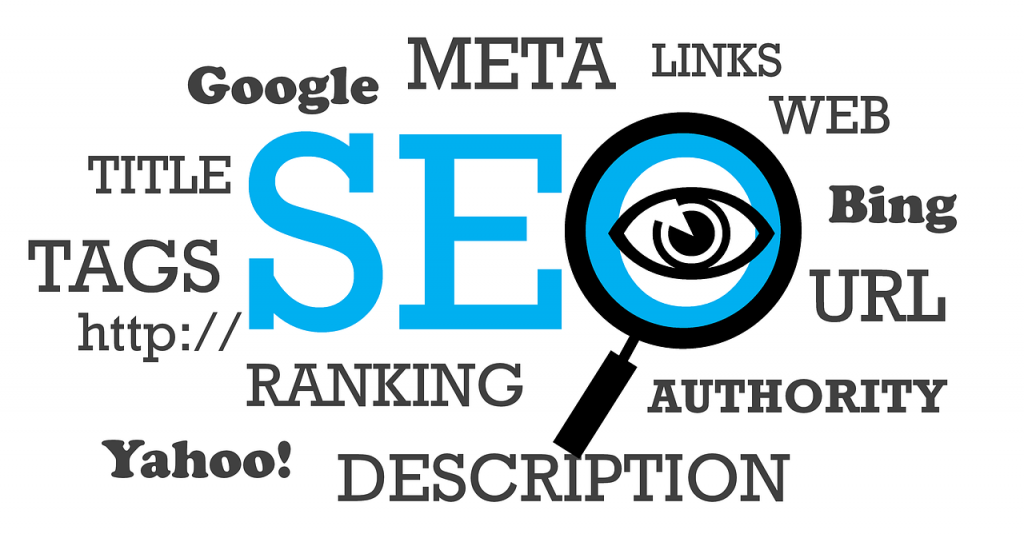
Evaluating SEO Outsourcing Companies
To evaluate potential partners, I would insist on reviewing detailed case studies and performance metrics from previous clients. For example, I would ask for evidence of a 100%+ increase in organic traffic or improved local rankings for a comparable business. This data-driven approach would be essential in verifying that an agency can deliver on its promises.
Questions to Ask Your SEO Service Provider
I would always recommend preparing a list of specific questions such as:
“What concrete strategies will you implement on a monthly basis?”
“Which industry-specific tools do you rely on for managing local SEO?”
“Can you provide examples where you successfully adapted your strategy after major algorithm updates?”
These questions help verify that the provider has both the technical expertise and the agility to adjust to evolving market demands.
Top SEO Firms vs Local Marketing Agencies
When comparing top SEO firms to local marketing agencies, I would note that while large firms might offer extensive national campaigns, local agencies often provide a deeper understanding of regional dynamics.
I would advise that if the target market is tightly focused geographically, a local agency might be better positioned to tailor solutions that resonate with the local audience. This is often reflected in the agency’s case studies, where they have driven tangible improvements in local search rankings.
Best SEO Outsourcing Company Characteristics
In my experience, the best SEO outsourcing companies share certain characteristics:
Transparency: They provide clear, detailed reports on how your budget is being used and the resulting performance improvements.
Communication: They make it a priority to deliver regular updates, be it through dashboards, weekly emails, or direct calls.
Adaptability: They adjust strategies quickly in response to algorithm updates or shifts in the competitive landscape.
Proven Expertise: Their portfolio should reflect successful work in similar industries or local markets.
Local SEO Strategies That Drive Results
A successful local SEO strategy must be as dynamic as it is systematic. I would outline a series of strategies that I have found to be particularly effective in driving substantial local search results.
Google Business Profile Optimization
Optimizing your Google Business Profile (GBP) is one of the most impactful elements of local SEO. I would advise that every profile be meticulously managed:
Complete and Accurate Information:
I would ensure that every field—such as business name, address, phone number, and hours—is accurate. Any discrepancies can confuse search engines and lead to lower rankings.Visual Engagement:
Uploading a selection of high-quality photos is essential. I would recommend having at least 10 to 25 images that showcase different aspects of your business—from the interior and exterior to products and services.Regular Posts and Updates:
I would schedule frequent updates on your GBP. This could involve announcements about seasonal promotions, new services, or behind-the-scenes glimpses that build trust and credibility.
Local SEO Campaign Planning
Effective planning is the foundation of any successful SEO campaign. I would structure a detailed plan that outlines clear goals, targeted keywords, and tactical execution steps:
Targeting Local Keywords:
I would conduct extensive keyword research to identify phrases with high local intent—for example, “24-hour vet in [City]” or “emergency plumber near me.” This research would help tailor your strategy to capture high-intent searches.Competitor Analysis:
Evaluating what local competitors are doing provides insights into market gaps. I would recommend that you carefully analyze competitors’ strategies and identify areas where you can outperform them.Content and Directory Integration:
While I might not focus on regular blogging if working primarily for Upwork clients, I would ensure that all static pages and directory listings reflect your targeted keywords and local context.
Successful Local SEO Techniques
Beyond the basics, I would incorporate advanced techniques that have consistently delivered results:
Optimized Content for Local Search:
Even in static pages, I would embed local references like neighborhood names, landmarks, or commonly searched local terms. This enhances relevance.Local Backlink Strategies:
Building relationships with local blogs, influencers, and community websites is another technique I would employ. Acquiring high-quality backlinks from reputable local sources can significantly boost authority.Schema Markup Deployment:
Implementing structured data (schema) helps search engines understand your content better. I would ensure that information such as operating hours, service types, and reviews is clearly marked up.Review and Reputation Management:
I would also implement strategies to generate and manage online reviews—turning positive feedback into a powerful local ranking signal.
Local Business Citation Building
Citations—mentions of your business’s name, address, and phone number on other websites—are critical for local search rankings. I would focus on:
Ensuring Consistency:
I would double-check that your business information is uniform across all platforms. Consistent NAP data signals reliability to search engines.Prioritizing Quality:
I would advise that you target high-authority directories such as Google My Business, Yelp, and industry-specific sites rather than chasing every single listing opportunity.Regularly Auditing Citations:
Over time, information can become outdated. I would implement periodic audits to ensure that all citations remain accurate and beneficial.

Services Offered by SEO Agencies
When selecting an SEO outsourcing partner, I would look for a robust suite of services. A reputable agency should offer a full range of services that cover both the technical and creative aspects of SEO.
Comprehensive SEO Audit Services
A thorough SEO audit is essential for establishing a baseline and identifying areas for improvement. I would expect the agency to:
Examine Technical Elements:
This includes finding broken links, checking for duplicate content, and ensuring proper indexing.Identify On-Page Issues:
I would expect them to assess meta tags, header structures, and internal linking strategies.
Digital Marketing Services Integration
SEO rarely works in isolation. I would look for agencies that integrate SEO seamlessly with other digital marketing efforts:
- Google Ads Integration:
Coordinating SEO and paid search helps capture both immediate and long-term leads. I would recommend ensuring that strategies are aligned across channels. - Social Media Synergy:
Enhancing content visibility through social media can also boost local SEO. I would discuss tactics for sharing optimized content, building local community engagement, and more. - Comprehensive Reporting: An effective integration strategy includes detailed performance reports that show how various channels interact to drive traffic and conversions.
SEO Campaign Management
Managing an SEO campaign is an ongoing process. I would seek an agency that provides:
- Regular Monitoring and Adjustment:
I would expect the agency to monitor local search performance continuously and make iterative adjustments as needed. - Clear and Detailed Reporting:
Transparency is key. I would request consistent, clear reports that explain what is being done and why. - Dedicated Account Management: A dedicated manager who understands local nuances can make all the difference—especially in responding to sudden market changes.
Products and Services Optimization
Beyond website optimization, I would also consider strategies to optimize specific products or service pages:
- Local-Specific Enhancements:
For instance, I would ensure that product pages or service descriptions include locally relevant keywords and clear calls-to-action. - User Experience Improvements:
Ensuring a seamless user experience—from fast loading times to mobile optimization—is crucial for driving local engagement. - Conversion-Focused Adjustments: I would work with the agency to optimize landing pages with data-backed adjustments that are designed to convert visitors into customers.
Working with Digital Marketing Agencies
Working with broader digital marketing agencies is sometimes necessary, especially when SEO is part of a larger strategy. I would carefully evaluate how these agencies manage their SEO efforts as part of their overall service offering.
SEO Reseller Relationships
Many digital marketing agencies outsource their SEO work to specialized providers. I would:
Verify the Chain of Command:
Ensure that the primary agency and the outsourced team have a smooth, direct communication line so that there are no delays or misinterpretations.Confirm Quality:
I would insist on transparency regarding who is doing the work, their credentials, and previous results. This helps prevent any surprises later on.
How Marketing Agencies Handle Local SEO
I would also be interested in understanding how a digital marketing agency tackles local SEO differently from specialized SEO firms:
Localized Campaign Strategies:
I would ask for details on how they develop strategies tailored to local markets versus national campaigns.Case Studies:
I would look for specific examples that show measurable improvements in local rankings and customer engagement.Cross-Channel Coordination:
Coordination between SEO, PPC, and social media is key. I would evaluate how well they integrate efforts to provide a unified strategy.
Communication Best Practices
Effective communication is non-negotiable. I would ensure that any agency I work with adheres to best practices:
- Regular Updates:
Weekly or biweekly updates should be a given, ensuring that I am always aware of progress. - Clarity and Simplicity:
All technical details should be communicated in an understandable way—no unnecessary jargon. - Open Feedback Channels: I would expect an open dialogue where I can provide feedback on strategies and results, ensuring that the process remains collaborative.
Measuring ROI from Outsourced SEO
Measuring the return on investment is an essential aspect of any outsourced SEO strategy. I would implement a robust set of KPIs to track performance:
Local Search Rankings:
I would utilize tools like Google Search Console and Local Viking to monitor how rankings improve for target keywords.Traffic Metrics:
Detailed analysis using Google Analytics would help to measure increases in organic traffic, along with engagement metrics such as bounce rate and time on page.Lead Conversion Rates:
I would set up tracking mechanisms (e.g., UTMs, call tracking) to determine how well SEO efforts convert visitors into leads and ultimately sales.Google Business Profile Insights:
Monitoring the number of views, clicks, and direct actions (like direction requests) would offer additional indicators of performance.
I would iterate on the strategy regularly based on these metrics, ensuring that the approach remains as effective and agile as possible.
Local SEO Strategy Implementation
Implementing a local SEO strategy requires a step-by-step approach that I would follow meticulously. Below is the detailed process I would design for a comprehensive local SEO campaign.
Creating a Local SEO Strategy
I would always begin with a clearly defined strategy that sets the roadmap for every action:
Conducting an In-Depth Audit:
I would evaluate the current digital presence, identify any issues (technical, content, citation), and set a baseline for improvement.Establishing Clear Goals:
Whether the aim is to drive more foot traffic or increase phone inquiries, clear objectives are essential.Developing a Keyword Strategy:
I would conduct extensive research to identify local, high-intent keywords, customizing the approach to target specific neighborhoods or service areas.Mapping Out the Customer Journey:
Understanding how local customers interact with a brand helps design content and navigation strategies that capture attention and drive conversions.

Outsource Your SEO: Step-by-Step Process
If I were to create a step-by-step process for outsourcing local SEO, it would look something like this:
Initial Consultation and Goal Setting:
I would begin by discussing the client’s specific needs, target markets, and budget. This session helps define clear objectives.Selecting a Trusted Partner:
Based on the evaluation criteria mentioned earlier, I would research and choose a partner that aligns perfectly with the client’s goals.Kickoff and Audit:
I would initiate the project with a full audit, providing a baseline report and a prioritized action plan.Execution of Specific SEO Tasks:
The work would be divided into manageable tasks—from on-page optimization to local citation building—with clear deadlines and responsibilities.Monitoring, Reporting, and Adjustments:
I would ensure continuous tracking of performance metrics and adjust the strategy every month to optimize results.Review and Scale:
Based on the achieved outcomes, I would assess whether it’s time to scale up the services, especially during peak business periods.
Local SEO Campaign Execution
When executing a local SEO campaign, I would organize the work in clear phases to ensure each stage builds on the previous one:
Phase 1 (Month 1):
Conduct a complete technical and local citation audit.
Claim and optimize the Google Business Profile.
Set up baseline tracking for KPIs.
Phase 2 (Month 2):
Implement on-page optimizations according to the targeted keyword strategy.
Begin outreach for local citations and backlinks.
Start updating the GBP with regular posts and new images.
Phase 3 (Month 3 and Beyond):
Continue with advanced tactics like schema markup and local influencer outreach.
Monitor performance data closely and tweak the strategy based on trends and insights.
Monitoring Local Search Performance
Monitoring is critical. I would set up a dashboard that includes key metrics such as local search rankings, website traffic, and GBP engagement. Regular reviews would allow for quick adjustments, ensuring that the entire strategy remains agile and effective in the face of evolving market trends.
Specialized Outsourcing Options
Depending on the nature of the business and its geographic scope, specialized outsourcing can be extremely beneficial. I would outline several scenarios in which tailoring the outsourced services would be most effective.
Outsource Local SEO for Multiple Locations
For businesses operating in multiple locations, I would:
Centralize the Management:
I would recommend using tools like BrightLocal or Yext to manage several Google Business Profiles from a single dashboard.Location-Specific Optimization:
Each location should have tailored keyword strategies and localized content. I would advise developing unique landing pages or profiles that cater to the specific needs of each geographic area.Consistent Reporting:
Monitoring performance for each location and comparing results would provide valuable insights into where to further invest resources.
SEO Outsourcing Service Packages
I would typically advise clients to select from different service packages based on their unique needs and budgets:
Basic Package (~$500/month):
This would cover essential services such as citation building, GBP optimization, and periodic performance reporting.Advanced Package (~$1.5k/month):
For businesses seeking more comprehensive support, this package would include additional local backlink outreach, in-depth on-page optimization, and enhanced reporting.Premium Package (starting at ~$3k/month):
For large-scale needs, this package might combine advanced technical SEO, ongoing strategy refinement, and potentially local advertising management.
Industry-Specific SEO Solutions
Different industries often require specialized SEO tactics. I would advise customized solutions based on the specific needs of the business:
Restaurants:
I would recommend optimizing for keywords like “outdoor dining in [City]” and ensuring that menus and promotional offers are integrated into the local strategy.Contractors:
For contractors, I would emphasize the importance of clear service areas and highlighting certifications or licenses that build trust.Retail Businesses:
I would ensure that product pages include details that cater to local shoppers—such as in-store pickup options, local inventory information, and clear calls-to-action.Other Niches:
Each niche has unique requirements, and I would always begin by understanding the customer journey before tailoring a specific SEO plan to capture local markets.
Conclusion: Maximizing Your Local SEO Investment
Maximizing your local SEO investment is not a one-time effort—it is an ongoing process that requires careful planning, execution, and continuous improvement. I would always advise that the key to long-term success in local SEO is a commitment to consistency and strategic outsourcing.

